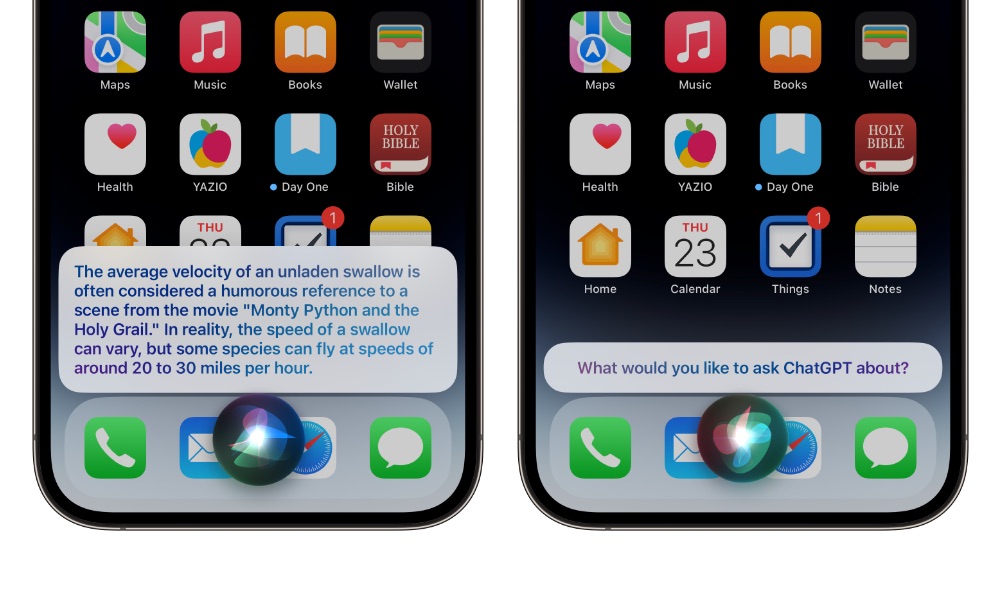iOS 18 AI Features Will Be Opt-In For Fear of ‘Rogue Chatbots’

Toggle Dark Mode
By now, it’s safe to say that we can expect some significant and exciting announcements related to generative AI during Apple’s keynote at next week’s Worldwide Developers Conference (WWDC). However, it seems like Apple has taken a somewhat winding and cautious road to reach this point.
Key to Apple’s new AI venture is a partnership with OpenAI to integrate ChatGPT into the iPhone experience. This will likely put ChatGPT behind Siri voice requests, but the well-known chatbot technology may also power other aspects of iOS 18.
While Apple still prefers to run as many AI tasks directly on the iPhone as possible, there’s no realistic way that even the best A17 Pro chip can handle everything. Those things that are beyond the capabilities of today’s Apple silicon will be outsourced to cloud servers. Apple will likely run some of those servers in its own data centers, but it’s planning to rely on OpenAI to fill the gap, at least for now.
Apple is expected to announce this partnership next week. Still, the company’s executives are said to be quite wary about positioning the new ChatGPT-based features as an integral part of iOS 18 — even if they end up being deeply integrated into the user experience.
For example, we shared a report by The Information last week that noted that Apple wants to make it obvious to users when Siri is using ChatGPT to answer their queries. Today, Bloomberg’s Mark Gurman also weighed in to add that Apple plans to make the entire suite of AI features “an opt-in service.”
But Apple is expected to offer its new AI features as an opt-in service, according to the people familiar with the matter. So wary customers could easily steer clear of them if they’d prefer.Mark Gurman
It’s unclear where Apple will draw this line. After all, even iOS 17 has AI-based features like Personal Voice and Live Voicemail, but it almost certainly includes anything related to ChatGPT and OpenAI.
For one thing, Apple executives have reportedly been concerned about a “rogue chatbot” that could damage the company’s reputation, according to Gurman, who adds that there are those within Apple’s upper echelons that “even have a philosophical aversion to having a chatbot at all.”
Still, with all the hype around AI, it’s something Apple can’t afford to pass on. iPhone customers have been waiting for Siri improvements for years, and now that ChatGPT has come on the scene, those desires are reaching a fever pitch.
While Apple has developed a few powerful AI features on its own, they fall short of what the more conversational chatbots can do, leaving Apple with no choice but to outsource those if it genuinely wants to give Siri a leg up.
Apple found that its AI is capable enough to power features like voice memo transcriptions and photo editing, as well as new search capabilities in the Safari web browser and auto replies in apps like Messages. But it determined early on that OpenAI and Google were far ahead in chatbots and on-the-fly assistance.Mark Gurman
ChatGPT may not be the only chatbot that Apple partners with, but it’s the first (and only) deal it’s been able to reach thus far. Apple is still in talks with Google about licensing Gemini, but it apparently got better business terms from OpenAI, which it believes is the best currently available. Sources said there were also concerns that integrating Google AI might be seen as conceding that its biggest smartphone rival is ahead of it in that area. After all, if Google Gemini powers the iPhone’s AI, folks looking for the “best” AI features might as well skip the middle man and buy a Google Pixel instead.
However, Apple doesn’t likely see the OpenAI deal as a long-term solution. It was just what Apple needed to do to get generative AI improvements off the ground before it fell too far behind the curve. Plus, as Gurman notes, outsourcing the chatbot can also help Apple “distance itself from the technology itself,” allowing it to divert the focus to OpenAI if things go a bit haywire.
Gurman also spoke with Dag Kittlaus, Siri’s co-founder from the days before Apple acquired it, who believes that the OpenAI partnership is likely a “short- to medium-term relationship” that will fill the gap while Apple builds out its own “core competencies” in this area. However, it provides an opportunity for Siri to “finally live up to its potential” by removing the technical constraints that held back the “original Siri vision” of 15 years ago.
Features like voice transcription and photo enhancements will likely be processed on-device. If recent rumors are accurate, these may require an iPhone 15 Pro or newer due to its higher amount of RAM and more powerful A17 Pro chip. However, it’s also possible that Apple could offload those same things to its cloud servers on older devices, similar to what it did with on-device Siri in iOS 15. Devices with an A12 Bionic chip could process more Siri requests on your iPhone, but older devices could still handle the same requests by sending them to Apple’s servers.
[The information provided in this article has NOT been confirmed by Apple and may be speculation. Provided details may not be factual. Take all rumors, tech or otherwise, with a grain of salt.]








